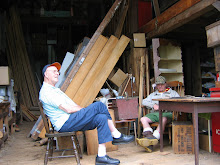Coy
Part Twenty-Two
"Good Fortune - Bad Taste"
In
the fourth chapter... and I do not like writing in this format... the end of
the tale is first introduced.
Helen presents the characters “Daddy”, “Mama”, “Aunt Winnie” and Helen’s
children. She continues by
including these ‘family’ as determining her views of good and bad taste within
the Savage estate.
Exposing Aunt Winnie through
photographic portrait, Helen spikes home the inter-estate good and bad taste
determinants through a very cavalier sale to me of a Steuben Glass olive
dish. Few antiquarian dealers will
ever ...share... a similar purchase format so it should NOT be a ‘down played’
sequence of action. This sequence
is founded on the notion ...by Helen... of ‘who cares’ (Parts Fourteen
[A-B]). Here is that wording’s
first appearance in this tale.
It’s usage appears through Helen’s observations of taste and aesthetic
comprehension by her children... who have purchased Helen a ...cell phone. Helen also tags the ‘her bank’ as a
mustered-into-action ‘who cares’. They care about the estate’s content? Or it’s asset value? Throughout this ...actually deep within
the wholeness of the Savage Estate... action packed... and seemingly flippant
‘she’s driving’* ...estate management
hubbub... I scramble with folded twenty dollar bills and the purpose-of-visit
(role) as being to ‘suggest’.
Actually...
what this chapter is... IS the ‘pitched’ and ‘turned up side down’ of the
Savage estate... already in progress.
Is
Aunt Winnie a culprit? She and her
shopping?
Are
Helen’s children doing something OTHER than acting out their own historical
destiny within the estate?
Is
there an inkling ...by Helen... of there being ‘something more’ to this
...houseful of old dead peoples’ stuff layered in room... after room?
When
I did eventually ‘get into’ Aunt Winnie’s room... I found a room that was... AT
THE BOTTOM LAYER... “just as” Aunt Winnie had ‘left it’, ‘kept it’ and had
WANTED IT TO BE... inclusive of having NO PREVIOUS Savage family ANYTHING in
that room... because, evidently, SHE took ‘any of that’ OUT. Between the time of her death and my
admittance into her room... the room had become... a three (?) generation
STORAGE ROOM ‘layered’... in three (?) generations UPON Aunt Winnie’s ‘stuff’
‘undisturbed’. THAT status,
alone... to I... qualified the room as ‘time capsule’ status within the Savage
estate EVEN THOUGH THAT ROOM’S CONTENTS... ‘isn’t really that old’.
Do
I ‘suggest’ this? To anyone?
Does
anyone ever... ‘who cares’?
And
again...: Is Aunt Winnie... and
the ‘her room’... therefore... a culprit?
In
the ‘pitching’ and ‘turning up side down... of
JUST
WHAT?
The
fifth chapter answers these queries.
Helen tells... rather well... her family saga; the story of the Savage
fortune. If one remembers that
saga told clearly, then fine. If
not... one should review it. I
make here and now two additions to the saga. Helen, at the time of her pontification, included the curt
(and obviously recited from oral history memory) utterance that “THE SAVAGES...
WERE ALL... temperance men and abolitionists”. And: “They
TOLERATED church going”. Curt,
breezy and short this recital...; it is NOT primary to the Savage fortune
saga. It means... roughly... One
John and family believed and supported ‘temperance’ but... drank whenever they felt like it
including that the current heir (Helen) “does too”. It means that they were against slavery and for freedom of
the black man but... had maybe seen a half dozen black men in Maine over a
forty year period, probably never talked to one, had never seen a slave...
except perhaps off in the ‘safe’ distance ‘on shore’ from the deck of a boat
‘once’ ‘when’ they ‘were younger’.
Helen’s ‘a black man’ actual contact heritage / history follows this
course including ‘safe distance’ in her own exotic harbors (Florida). “Tolerated church going” means they
never went to church ever and any contact with a ‘church man’ was on the
equality of an eye for an eye with this well understood by both parties. Helen... ‘follows family’.
What this addition means...
combined with the Savage fortune saga... is that... culturally, intellectually,
artistically, philanthropically, philosophically and... et al... the Savage
estate is... ‘probably’ ‘dry’ from
MY
VANTAGE
As
an antiquarian and rare book man.
WE...
will ‘see’ won’t we.
This tale is about the
ESTATE.
ON THE OTHER HAND... and one may
actually look at one’s hands... the hand with ‘this’ (the ‘dry’) is OFF SET
FULLY, fundamentally and fabulously by Helen’s expressed clear understanding
that “THIS IS REAL”. This is my
second addition to the Savage saga.
The Savage estate ‘cannot be faked’ or purchased as decor. And this is again spiked home with
Helen’s “It’s over”. Helen,
because she actually LIVES (she is still alive) THIS... she fully understands
...although currently as the tale is being told... has yet to articulate or act
on it...; that ‘this’ (the Savage estate in total) is not about money and
‘antiques’ (‘the THINGS we have’).
In the “vicious swipe of the dragon’s tail” (Part One)... of this
tale... the Savage estate IS a dragon.
It
is... ‘old New England traits.
This
includes the ‘old New England’ word; ‘dry’.
‘Dry’
is ‘pitched’ by Aunt Winnie... way back when. Or was that seed bed planted earlier... as an inner family
dynamic that Aunt Winnie is the first to act out?. Too much money and too little culture resulted in ...bad
taste... at the expense of ‘old New England traits... These old traits... were suppressed behind closed, locked,
dark, Victorian drape dropped rooms that dominate the interior of the
estate. Their suppression was
supported by the modern taste makeover of the personal space; the ‘their room’,
of the younger Savage generations.
This was made possible with ‘money’. That made ‘shopping’ possible. Space, throughout the estate, allowed for the old new
England traits to be ‘put somewhere’... even if it was in a mound along the
floor under a table in a room that one walked through ‘all day long.’ In the Savage estate... an object put
down in a room by one generation... most often remained there ...until I
handled it. This included later
generation objects and ‘bad taste’ objects. Modern ‘bad taste’ contributed at least a quarter and
possibly a third to the contents of the first floor of ‘the mansion’. And
again, this ‘modern bad taste’ was set down upon – on top of - the earlier
objects that TOO, were ‘set down’.
That
is quite a few chapters ahead (Part Seventeen) of this; my current counting of
chapters on my fingers in review...:
I am in that February barn where I ...pontificate... on
The:
“I study... The Enigma.
“As
one ages, one confronts a new enigma.
‘Setting’... ‘there’ ‘so it will not get lost’... turns to enigma for
one ...aging... as...: “Does ‘it’
ever become something OTHER than a ‘never getting it... again’?”. Old barns... especially the very old
barns... are the repositories of this enigma’s ‘turned out to be’. They are ...wholly... a keeping ground
of that enigma; the ‘setting there’ and the ...never getting it again. The scathing real of this enigma only
becomes to one with self experience... as one, oneself, finds oneself... the
‘setting there’ and ‘...never getting it again’ of one’s own life. The old New England barn is the keeper
of this ...generation after generation... embraced and expressed... enigma.”
At
the end of this... (Part [D] of Part Eighteen [A-D]) chapter SET ... within the
February barn...I ...noticing an old Coke machine and its ‘setting down’ or
‘pitched’ within the barn ...and that notice is found within the tale’s telling
of... incursions upon the this; the ...‘it’ of the Coke machine and the... ‘it’
of the barn, the ‘I’ in the barn, the ‘them’ in the barn and... the barn as a
‘big box’ whole of ‘setting down’ and ‘never getting’:
“....The
old New England Coke machine... in the old New England barn... is nothing at
all but a vanity; an ornament, by itself.
Found mired in old New England humanity... with humility... inside an
old New England barn door... it is a precious blossom of classic (and rare
survival) New England; a pure strain ‘unspoken’. It is ‘a desperate need’ to ‘notice this’
I
continue:
“...RIGHT
HERE I do also say that this tale ‘reaches bottom’; I AM at the dark, cold spot
within I NEED TO BE AT. .... I am
turned back into the Savage estate... WITH NEW UNDERSTANDING that what was
formerly ‘pitched’ and turned up side down New England has been PROVEN to be
... in fact... New England right side up (Part Six [A]). This, too, means I am not done with
congested New England and their white SUV’s (Part Six [D]) or Helen’s BLUNT
verbiage of “THEY SENT ELIEEN FISHER UP HERE TO APPRAISE ME!”. I have the tools at hand to save the
Savage estate? But:
Is
this ‘dull’?
To
one?
Dull...
is different from ‘dry’. Dull is
it to one IF one is IN their white SUV... driving right on my rear bumper...;
chasing I... with their bad taste of congested New England? “JUST ‘clean’ the place out and be done
with it”.
“Let
us know if you find something good”.
“How
much is that worth?”
One
asks.
Then...
that being so; that there IS NO POT OF GOLD... PASS ME
On
the first open space of road ...with one’s premium acceleration of BAD TASTE...
so that I may with a fleeting second... SEE
One’s
local (license) plate number, one’s landfill access sticker. One registration expiring... at the
EXACT same rate as one ‘distances’ me ‘in rearview’.
And
then I am alone again.
And
it is not dull.
As
I watch her hand turn the key that was in the door’s lock
Of
this door closed tight
‘kept
locked’
In
a dark hallway closed at both ends’
“SHOWING
YOU THIS ROOM TODAY”
“BECAUSE
I THINK I’D BETTER”
Helen
said to me as she
Turns
the old key
In
the old lock
In
the dark.
“The
door STICKS TOO.” she said.
* Part Six
[D] where the context of that wording’s first introduction appears as the
‘congested New England’ white SUV driver driving as a... destroyer of... old
New England










No comments:
Post a Comment